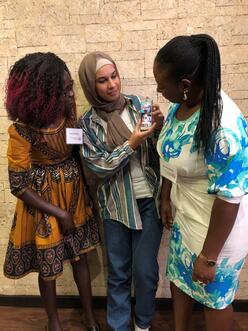December 12, 2018 — Kristy Crabtree, Information Management Specialist for the IRC, is the technical lead on our ECHO-funded ROSA project, she explains why its significant.
To protect people on the move, we must move with them. It is becoming more challenging to reach people as camps no longer host the majority of people fleeing violence, displaced people are now more likely to turn to cities for refuge, or become ‘roving populations’ and avoid settling in one place.
Women and girls affected by gender-based violence can be particularly hard to access. Many women will face abuse at the hands of their partners. This makes it even more crucial for humanitarian staff to meet women where they’re living in order to respond to it.
Staff working to prevent or respond to gender-based violence (GBV responders) are constantly on the go, they’re in cars, going to clinics or community centres or other urban sites. It makes traditional forms of training, like face-to-face instruction, less feasible.
The International Rescue Committee has responded with ROSA: a new mobile app that provides vital training for staff supporting people affected by gender-based violence. As the technical lead of the project, I’ve seen first-hand the impact this has already had on vulnerable women and girls.

ROSA enables staff to access coaching, information and assessments through their mobile phones. It can be used without internet connectivity and whilst staff are en-route to clients. Its flexible format is proving pivotal to reaching extremely vulnerable women and girls.
Currently in its pilot phase, ROSA’s global rollout is expected early next year and presently has capacity to train GBV responders and community focal points in countries including Burundi, Iraq and Myanmar. It has forty modules ranging from self-care, how to work with adolescent girls who have experienced abuse or sexual violence, supporting survivors with disabilities, and managing cases of women and child survivors.
ROSA acts as a one-hundred-page manual that can be carried in your pocket, incorporating different learning styles and techniques. It comprises a variety of methods - audio lectures, quizzes and videos, but it also includes a community space where global responders to can connect and share knowledge and expertise.
Its innovative digital format means we’re able to continue to add to it and make improvements. As trends in displacement evolve, it is crucial that the humanitarian world evolves alongside it: ROSA is just one way the IRC are ensuring we can reach people in need, wherever they are.